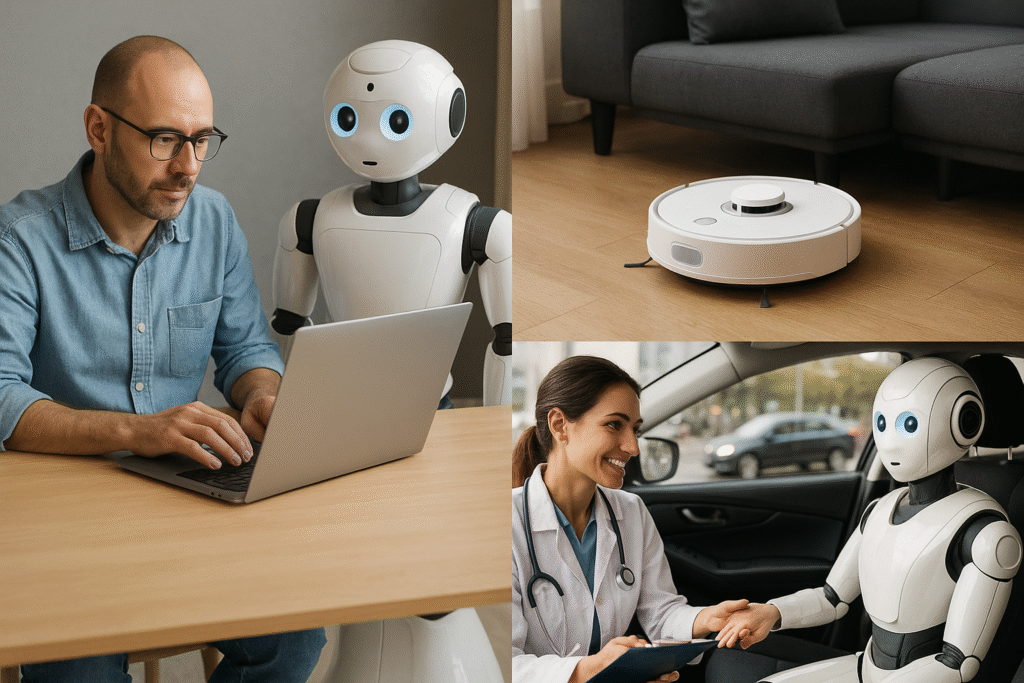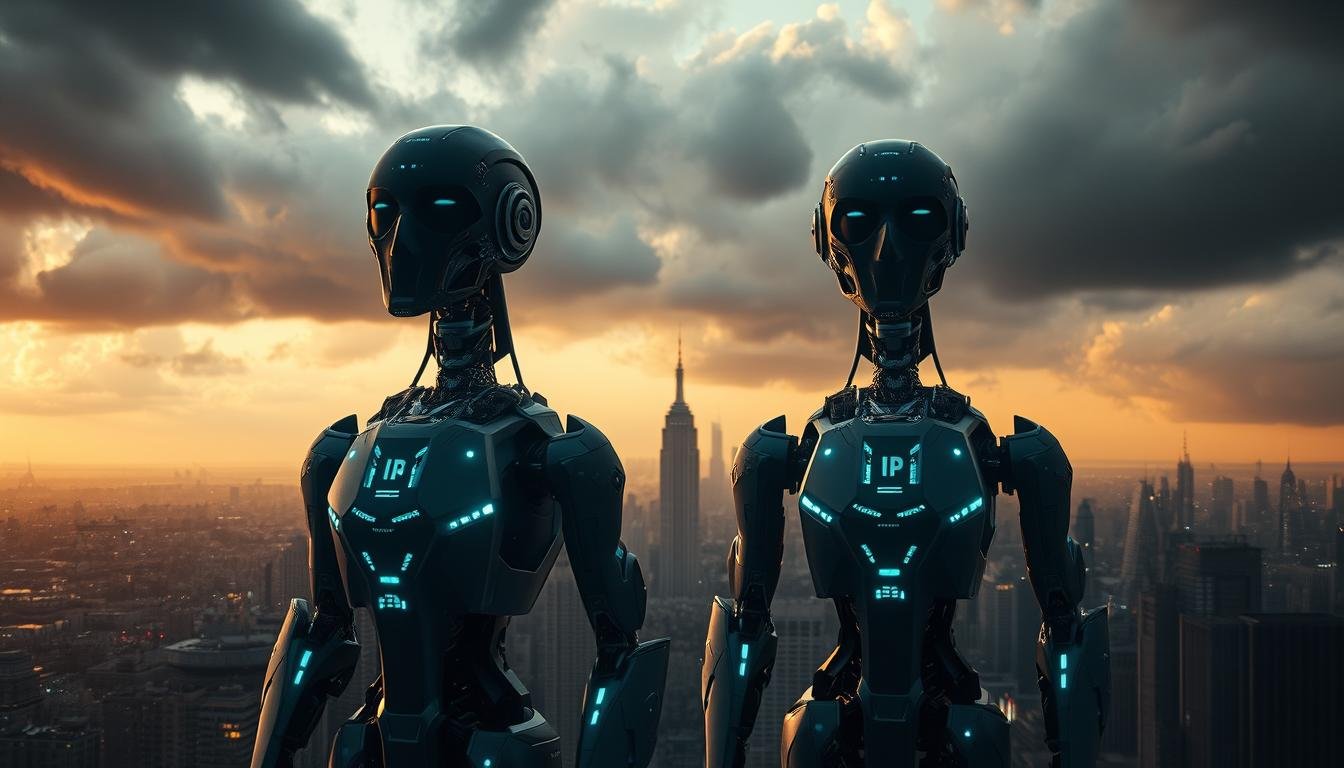Really AI Takeover the world in future, As AI and robotics advance quickly, the idea of robots taking over the world is more talked about. I’m fascinated by what AI can do and how it might change our lives. Companies like Boston Dynamics and Tesla are making big strides in automation.
This has sparked both excitement and worry. In this introduction to robotics and how robots are changing the world, I’ll explore the latest from tech giants, what experts say, and how society reacts. This will help us understand the future of robotics.
Understanding Artificial Intelligence: A Brief Overview
Artificial intelligence (AI) is a complex technology with core components. It uses algorithms to learn from data and make predictions. Machine learning and deep learning are key to AI’s operation.
Machine learning lets systems get better over time without being programmed. It uses data to find patterns and make decisions. Deep learning, a part of machine learning, uses neural networks to analyze complex data. This helps AI recognize images, understand speech, and even write like humans.
My study of AI shows how fast it’s advancing, thanks to research at places like Stanford University. Exploring AI reveals how it’s changing industries and improving our lives. It shows us what machines can do and makes us think about their future impact.
The Evolution of Robotics and AI
The journey of robotics and AI is truly fascinating. It started centuries ago with ancient mechanical automata. These early machines set the stage for all future advancements.
In the 1960s, the first industrial robots were created. They changed manufacturing, making it more efficient and accurate. This was a big step towards the AI we use today.
Natural language processing is another key achievement. It lets machines understand and talk back to us. This has changed how we interact with technology.
Studies in robotics journals and AI conferences show our progress. The history of robotics shows our creativity and drive for new ideas. It gives us a peek into what’s next for robotics and AI.
Current Applications of AI in Daily Life
AI has changed our daily lives in ways we might not even notice. It’s now part of our daily routines, from smart homes to healthcare. For example, smart home devices like Google Nest and Amazon Alexa make our lives easier. They control lights, manage security, and even help with cooking.
In healthcare, AI is a game-changer. It helps doctors diagnose better and care for patients. Hospitals use AI to look at medical images and predict patient outcomes. Companies like IBM Watson analyze huge amounts of data, leading to better diagnoses and treatment plans.
People find AI very helpful in their daily lives. It helps manage schedules, suggests content, and boosts home security. As AI gets better, it will become even more a part of our lives. It will change how we interact with the world.

Robots and Their Role in Society
Robots play a big role in many areas of our society today. They make things more efficient in manufacturing by reducing mistakes. This lets humans focus on more complex tasks.
In factories, robots take over repetitive jobs. This change has made work better for everyone. It has improved how things are made and how happy people are at work.
In the service industry, robots help with customer service. They answer questions and handle payments. This makes services faster and gives valuable insights to improve customer service.
Robots also work with people in the service industry. For example, in hotels, robots carry luggage. This lets staff do more important tasks and makes guests happier.
In healthcare, robots are making a big difference. They help with surgeries and care for the elderly. Robots make patient care safer and better.
Robots work with doctors and nurses to improve care. This shows how technology helps in caring for people. It’s a great example of robots and humans working together.
Studies show robots will keep changing the job market. They will create new jobs and make old ones better. It’s exciting to see how robots will help us in different ways.
The Potential Benefits of Advanced AI
Advanced AI brings big changes to many fields, changing how we do things and solve problems. I’ve seen how AI makes businesses work faster, saving money and making things more efficient.
In farming, AI helps farmers understand soil and weather better. This leads to better crops and less waste. It shows how AI can save resources and money.
Transport companies like Tesla and Uber use AI to make things run smoother. It’s amazing how AI makes travel safer and faster.
- Enhanced decision-making processes through data analysis
- Increased productivity across various sectors
- Cost-effective solutions that promote sustainability
Advanced AI is changing our world for the better. It’s making things more efficient and helping the economy grow. This benefits everyone.
Concerns and Risks Associated with AI Development
The fast growth of artificial intelligence raises many concerns. Job loss is a big worry. Automation is taking over simple tasks, putting many jobs at risk. This creates economic problems that need quick solutions.
AI safety is another major concern. AI systems make decisions without always checking if they’re right. This can lead to harmful choices, worrying experts and the public.
Privacy is also a big issue with AI. More data is being collected and tracked, threatening our privacy. People often don’t know how their data is used, leading to demands for better rules and openness from AI users.
In short, these problems show we need to talk more about AI. We must find ways to deal with these risks. This way, we can ensure AI helps us without harming society.
Ethical Considerations in AI and Robotics
Exploring AI and robotics, I face deep ethical questions. These go beyond just tech, touching on our society’s core values. A big worry is fairness in AI algorithms. If they’re biased, they can harm certain groups.
Who’s to blame when AI makes a mistake is another big issue. As AI gets smarter and more independent, knowing who’s responsible is key. This ensures AI is used responsibly.
AI in warfare raises serious moral questions. The choices AI makes in defense can have huge consequences. Groups like the IEEE help guide us in these complex issues.
Discussing these topics is essential. It involves ethicists, tech experts, and everyone else. By understanding AI and robotics, we can create a future where tech respects our values.
Conclusion
We are at a critical point in history with robotics and artificial intelligence. The progress we’ve seen has huge possibilities to change industries and make our lives better. But, we must balance innovation with caution in AI development.
The future of AI is not just about new tech. It’s about using these advancements wisely in our society. We need to understand and use AI in a way that respects human values.
Thinking about the future of AI, we must prepare for a world driven by AI. This means knowing what robots and AI can do and following ethical rules. Experts stress the need for strong guidelines to use AI’s power for good, protecting human well-being.
The journey ahead asks us to see the good in AI while tackling its challenges. By talking openly about these issues, we can build a future where tech and humanity work together well.

